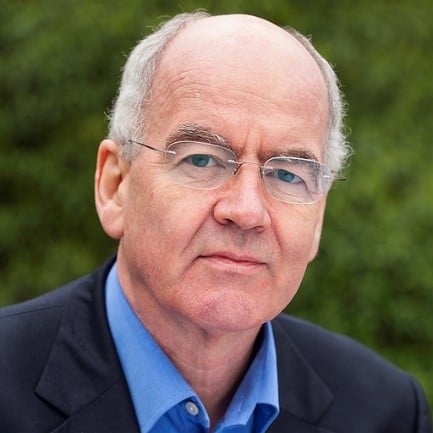The MDPI Sustainability Foundation is pleased to announce the recipients of the 2021 World Sustainability Award: Prof. Dr. John Elkington and Prof. Dr. Jianguo Liu. The recipients were selected from the nominations received over the course of the year, and were voted by the Selection Committee made up of the two permanent members: Dr. Shu-Kun Lin, founder and President of MDPI and founder and chairman of the MDPI Sustainability Foundation, and Prof. Dr. Ed Constable, former Vice President for Research of the University of Basel; as well as two non-permanent members: Prof. Dr. Manfred Max Bergman, Section Editor-in-Chief of the Sustainability journal, and Dr. Mathis Wackernagel, President of Global Footprint Network. The award is recognized with a sum of USD 100’000 to be divided equally between the two awardees. The World Sustainability Award prize money is entirely funded by the MDPI Sustainability Foundation.
Nominees for the World Sustainability Award may be individual researchers or groups of researchers, whereas the nominees for the Emerging Sustainability Leader Award are individual researchers aged 40 or under at the time of the submission deadline. The awardees must have made, and continue to make, a unique and outstanding academic or societal contribution to sustainability in general or to a sustainability-relevant issue in particular.
The World Sustainability Award and the Emerging Sustainability Leader Award are granted according to merit and impact, without any discrimination based on gender, race, religion, nationality, or political affiliation.
About Prof. Dr. John Elkington
Current affiliation: Volans, UK
 Professor Elkington is a world-renowned author, advisor, and entrepreneur who has advocated and promoted sustainability for more than four decades. He is Visiting Professor at the Doughty Centre for Corporate Responsibility, Cranfield School of Management, Imperial College, and University College London (UCL). Over the years, he has promoted sustainable development as an advisor to many governments, business, and civic institutions around the world. In 2008 he became the Co-founder and Chairman of Volans, a think tank and “future-focused business working at the intersection of sustainability, entrepreneurship and innovation”. One of his most significant contributions to the field of sustainability was the introduction of the triple bottom line in his 1997 book entitled Cannibals with Forks: The Triple Bottom Line of 21st Century Business. The concept of the triple bottom line, which promotes the idea that business should balance economic pursuits with social and environmental outcomes, has by now become a gold standard within the field of sustainability. Notably, it has been used as the benchmark for the development of global initiatives such as The UN Global Compact, the Global Reporting Initiative, and the UN Sustainable Development Goals (SDGs).
Professor Elkington is a world-renowned author, advisor, and entrepreneur who has advocated and promoted sustainability for more than four decades. He is Visiting Professor at the Doughty Centre for Corporate Responsibility, Cranfield School of Management, Imperial College, and University College London (UCL). Over the years, he has promoted sustainable development as an advisor to many governments, business, and civic institutions around the world. In 2008 he became the Co-founder and Chairman of Volans, a think tank and “future-focused business working at the intersection of sustainability, entrepreneurship and innovation”. One of his most significant contributions to the field of sustainability was the introduction of the triple bottom line in his 1997 book entitled Cannibals with Forks: The Triple Bottom Line of 21st Century Business. The concept of the triple bottom line, which promotes the idea that business should balance economic pursuits with social and environmental outcomes, has by now become a gold standard within the field of sustainability. Notably, it has been used as the benchmark for the development of global initiatives such as The UN Global Compact, the Global Reporting Initiative, and the UN Sustainable Development Goals (SDGs).
About Prof. Dr. Jianguo Liu
Current affiliation: Center for Systems Integration and Sustainability, Michigan State University, USA
 Jianguo “Jack” Liu is a world leader in systems integration and sustainability (e.g., integrating ecology with social sciences, policy, and technologies for understanding and promoting global sustainability). He holds the Rachel Carson Chair in Sustainability, and is University Distinguished Professor and founding director of Center for Systems Integration and Sustainability at Michigan State University (USA). He has translated many research findings to effective policy and management for global sustainability, especially in China. Furthermore, he has amplified the impacts through helping numerous others. Liu’s pioneering research has opened up new frontiers in sustainability and greatly advanced the fundamental understanding of global challenges. He coined the integrated concept of telecoupling (socioeconomic-environmental interactions over distances), and has been leading the development and applications of the award-winning telecoupling framework. This framework helps disentangle the complexity of globalization and systematically expand sustainability science from focus on specific places separately to human-nature interactions across distant places. It provides a powerful tool to uncover hidden impacts of human activities within specific places on sustainability elsewhere. Many of his research findings have been translated into effective policies and management interventions, which have helped the recovery of a global wildlife icon (giant pandas), improved management of protected areas, and revolution of China’s environmental protection.
Jianguo “Jack” Liu is a world leader in systems integration and sustainability (e.g., integrating ecology with social sciences, policy, and technologies for understanding and promoting global sustainability). He holds the Rachel Carson Chair in Sustainability, and is University Distinguished Professor and founding director of Center for Systems Integration and Sustainability at Michigan State University (USA). He has translated many research findings to effective policy and management for global sustainability, especially in China. Furthermore, he has amplified the impacts through helping numerous others. Liu’s pioneering research has opened up new frontiers in sustainability and greatly advanced the fundamental understanding of global challenges. He coined the integrated concept of telecoupling (socioeconomic-environmental interactions over distances), and has been leading the development and applications of the award-winning telecoupling framework. This framework helps disentangle the complexity of globalization and systematically expand sustainability science from focus on specific places separately to human-nature interactions across distant places. It provides a powerful tool to uncover hidden impacts of human activities within specific places on sustainability elsewhere. Many of his research findings have been translated into effective policies and management interventions, which have helped the recovery of a global wildlife icon (giant pandas), improved management of protected areas, and revolution of China’s environmental protection.
About the World Sustainability Awards
The World Sustainability Award was established in 2017 by the MDPI Sustainability Foundation to encourage new initiatives and developments in sustainability and is conferred to individual researchers or research teams who have made an outstanding academic or societal contribution to sustainability in general, or to a sustainability-relevant issue in particular.
The past recipients of the World Sustainability Award are Prof. Dr. Jeffrey D. Sachs and Dr. Sonia Ehrlich Sachs (2017), Dr. Mathis Wackernagel and Dr. Zhifu Mi (2018), and Prof. Dr. Michael E. Mann and Dr. Antonella Santuccione Chadha (2020).


